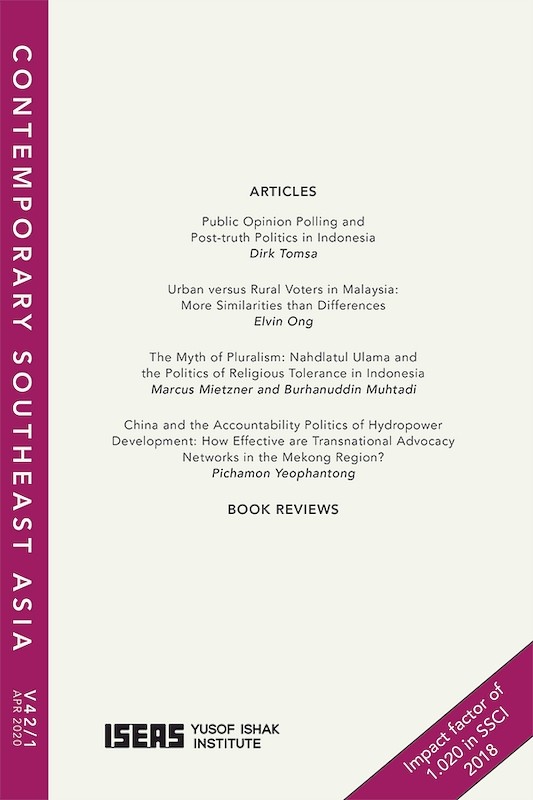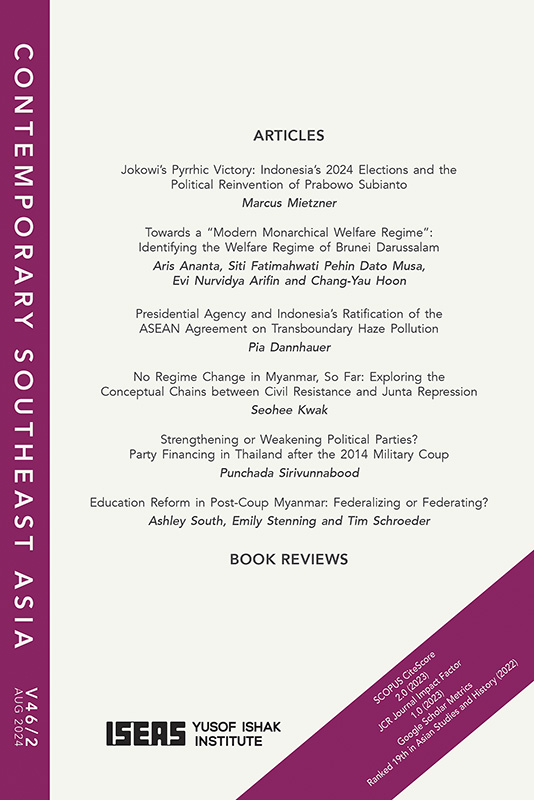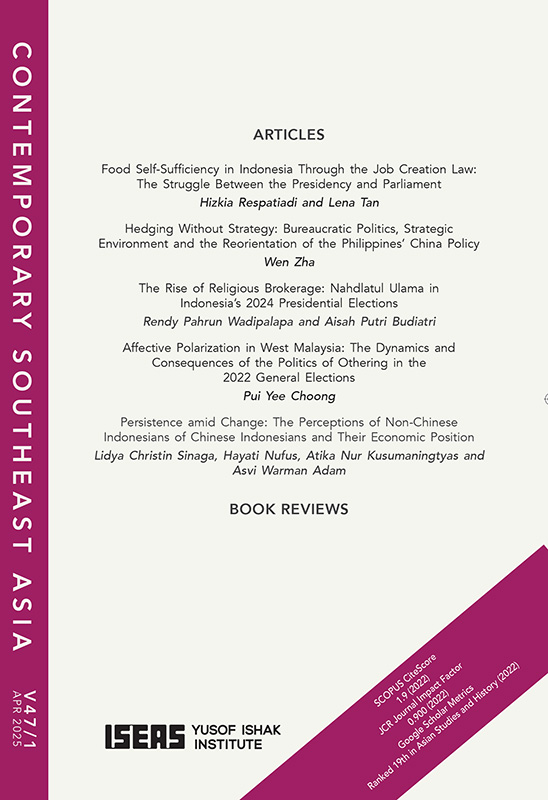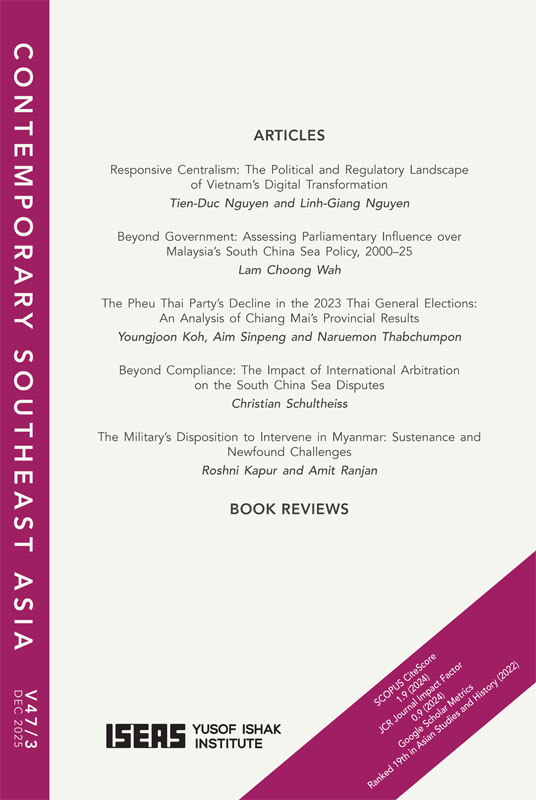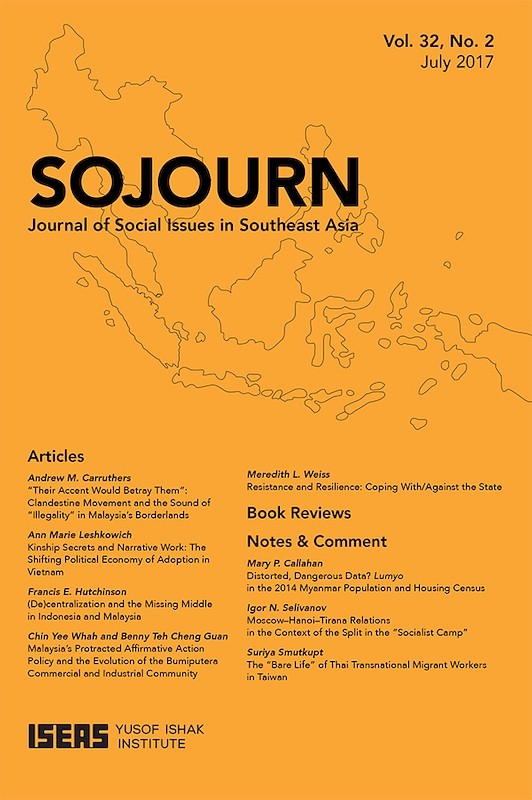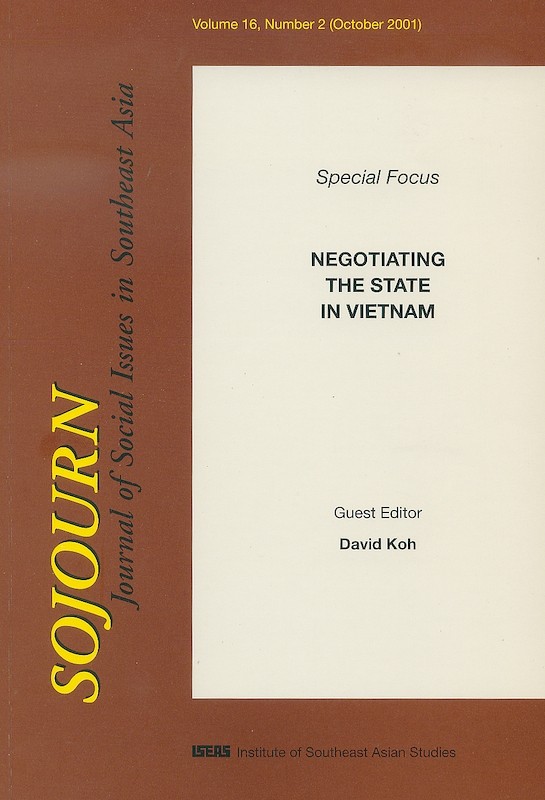Contemporary Southeast Asia Vol. 43/3 (December 2021)
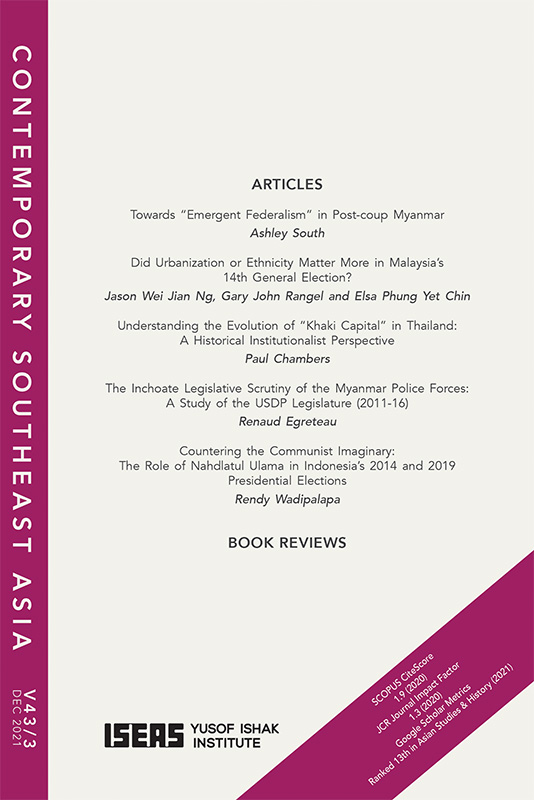
Date of publication:
December 2021
Publisher:
ISEAS – Yusof Ishak Institute
Number of pages:
160
Code:
CS43/3
Contents
-
Contemporary Southeast Asia Vol. 43/3 (December 2021)
[Whole Publication, ISSN: 1793284X] -
Preliminary pages
- ARTICLES
-
1. Towards “Emergent Federalism” in Post-coup Myanmar, by Ashley South, author see abstractAs a result of the COVID-19 pandemic and the 1 February 2021 coup, Myanmar is facing extraordinary human rights, political and socioeconomic crises. At this critical juncture, it is worth re-visiting and re-imagining the type of country Myanmar could be. Federalism has long been considered as the solution to the country’s protracted state society and centre-periphery conflicts and to enable ethnic minority communities to achieve self-determination. However, discussions about federalism are often framed in terms of revising or replacing the 2008 Constitution in a top-down manner. While constitutional change is necessary, federalism can also be seen as an “emergent” phenomenon, developing from the “bottom-up” out of the existing structures and practices of the ethnic minority communities and the Ethnic Armed Organizations (EAOs). Several EAOs have long-established governance regimes in their areas of control or influence, delivering a range of essential and life-saving public services to their communities. These local frameworks of public administration and services provision can serve as important building blocks of a bottom-up federalism, especially given the collapse of a credible and legitimate Myanmar state. As such, EAOs should be supported to develop their governance and services delivery systems. Arguably, the present multiple crises in Myanmar offers the closest approximation since the 1947 Panglong Conference of the idea that a federal union should emerge out of agreements among sovereign states, i.e. that state formation (and sovereignty) must precede a federal constitutional settlement.
-
2. Did Urbanization or Ethnicity Matter More in Malaysia’s 14th General Election?, by Jason Wei Jian Ng, Gary John Rangel, Elsa Phung Yet Chin, authors see abstractThis article focuses on identifying the variable which has the highest predictive power in predicting electoral behaviour. To do this, we apply a tree-based machine learning technique to data from Malaysia’s 14th General Election. We find that constituencies’ urbanization level has the most significant predictive power in determining vote share. Ethnicity, a long-touted variable of significance, plays a secondary role. Moreover, these predictors’ marginal effects on the vote share are highly complex, non-linear and difficult to pick up by conventional regression methods. Other explanatory factors do not exhibit significant predictive qualities of electoral behaviour, although the extant literature has shown them to have important causal relationships. As our analysis reflects the significant predictive power of urbanization in predicting voting behaviour, we caution against the haste to dismiss its relevance in the Malaysian context.
-
3. Understanding the Evolution of “Khaki Capital” in Thailand: A Historical Institutionalist Perspective, by Paul Chambers, author see abstractUsing the framework of Historical Institutionalism, this article examines the evolution of “khaki capital”, or the economic power of military forces, in Thailand, and how the history of Thai khaki capital has been shaped by the contours of Thai civil-military relations. The article argues that the military’s financial autonomy and economic power constrain the ability of civilians to control it. A combination of related factors—including Thailand’s legacies of authoritarianism, the monarchy’s support for the military, the armed forces’ ability to maintain its relative cohesion (while civilians remain divided), continuing national emergencies and the use of coups to impede civilian rule—has established a “lock-in” of authoritarian path dependence in Thailand. This, in turn, has allowed the military to maintain its influence over the national economy through the defence budget, land, corporate ownership and shareholdings as well as corporate sinecures.
-
4. The Inchoate Legislative Scrutiny of the Myanmar Police Forces: A Study of the USDP Legislature (2011–16), by Renaud Egreteau, author see abstractHow do post-authoritarian legislatures craft police oversight? This article applies McCubbins and Schwartz’s model of congressional oversight to Myanmar’s inaugural post-junta legislature (2011–16). It aims to assess whether parliament began to play a role in police oversight following the end of the junta’s rule in 2011. It draws on the analysis of official legislative proceedings and interviews with members of parliament from both the ruling Union Solidarity and Development Party (USDP) and the opposition. The findings suggest that—echoing large swathes of scholarship on parliamentary scrutiny in fledgling democracies—an inchoate form of “fire alarm” oversight began to develop. The Union legislature under the USDP emerged as a site for occasionally shedding light on police (mis)behaviour, but failed to effectively act on, or sanction, misconduct. Police scrutiny was tentatively fostered by a handful of backbenchers who had a keen interest in police issues, a background in security affairs or were facing pressure from their constituents to ventilate their grievances against the police in parliament. These findings contribute to a better understanding of the practice of police oversight in new legislatures operating under praetorian settings.
-
5. Countering the Communist Imaginary: The Role of Nahdlatul Ulama in Indonesia’s 2014 and 2019 Presidential Elections, by Rendy Pahrun Wadipalapa, author see abstractThe article examines the significant role of Nahdlatul Ulama (The Revival of the Islamic Scholars, NU), which claims to be the largest Islamic organization in Indonesia, in defending presidential candidate Joko Widodo (Jokowi) from allegations that he was secretly a communist. Historically, NU has been one of the main drivers of the “communist imaginary” in Indonesia, promoting the idea that communism is a “latent threat” to the country. However, in the 2014 and 2019 presidential elections, NU endorsed Jokowi and sought instead to debunk the communist imaginary. Based on elite interviews and documentary research, this article argues that NU’s decision was based on its brokerage relationship with the Jokowi camp. In return for mobilizing both its vast membership and institutional networks to mitigate the weaponization of the communist imaginary against Jokowi, NU was able to secure for itself key government and bureaucratic offices that would strengthen its political influence in Indonesia.
- BOOK REVIEWS
-
BOOK REVIEW: The US-Thai Alliance and Asian International Relations: History, Memory and Current Developments, by Gregory Raymond and John Blaxland, by Murray Hiebert, author
-
BOOK REVIEW: Children Affected by Conflict in the Borderlands of Thailand, by Kai Chen, by Ornanong Husna Benbourenane, author
-
BOOK REVIEW: Where Great Powers Meet: America & China in Southeast Asia, by David Shambaugh, by William Tow, author
-
BOOK REVIEW: The Filipino Migration Experience: Global Agents of Change, by Mina Roces, by Jean Paul L. Zialcita, author

